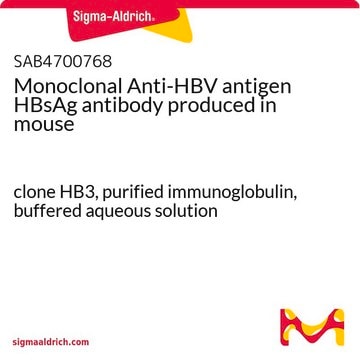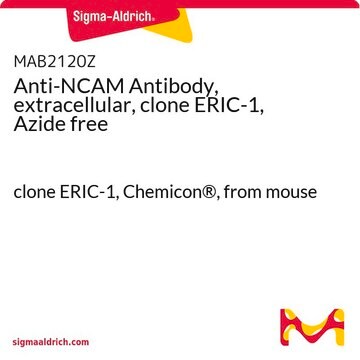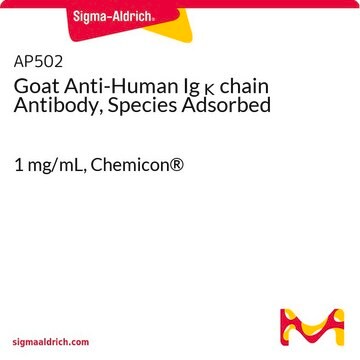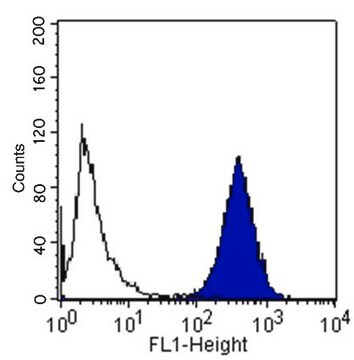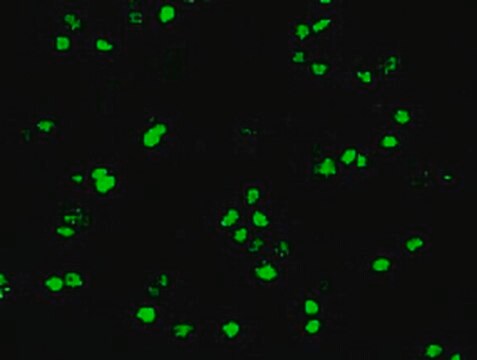MABE1177
Anti-PNKP Antibody, clone H101.2
clone H101.2, from mouse
Synonym(e):
Bifunctional polynucleotide phosphatase/kinase, DNA 5′-kinase/3′-phosphatase, Polynucleotide kinase-3′-phosphatase
About This Item
Empfohlene Produkte
Biologische Quelle
mouse
Antikörperform
purified immunoglobulin
Antikörper-Produkttyp
primary antibodies
Klon
H101.2, monoclonal
Speziesreaktivität
human, bovine, monkey
Methode(n)
ELISA: suitable
immunoprecipitation (IP): suitable
western blot: suitable
Isotyp
IgG1κ
NCBI-Hinterlegungsnummer
UniProt-Hinterlegungsnummer
Versandbedingung
wet ice
Posttranslationale Modifikation Target
unmodified
Angaben zum Gen
human ... PNKP(11284)
Allgemeine Beschreibung
Spezifität
Immunogen
Anwendung
Epigenetik & nukleäre Funktionen
Zellzyklus, DNA-Replikation & -Reparatur
Western Blotting Analysis: A representative lot detected the endogenous PNKP in A549 whole cell lysates, as well as purified full-length 60 kDa recombinant human PNKP and its 14.9 kDa N-terminal (a.a. 2-140) cyanogen bromide cleavage fragment (Fanta, M., et al. (2001). Hybridoma. 20(4):237-242).
Western Blotting Analysis: A representative lot detected the endogenous PNKP in CHO cell lysates and calf thymus tissue homogenates (Fanta, M., et al. (2001). Hybridoma. 20(4):237-242).
Immunoprecipitation Analysis: A representative lot immunoprecipited PNKP from A549 cell lysates (Fanta, M., et al. (2001). Hybridoma. 20(4):237-242).
ELISA Analysis: Clone H101.2 hybridoma culture supernatant was confirmed for its immunoreactivity against His-tagged human PNKP by ELISA (Fanta, M., et al. (2001). Hybridoma. 20(4):237-242).
Qualität
Western Blotting Analysis: 8.0 µg/mL of this antibody detected PNKP in 50 µg of A549 cell lysate.
Zielbeschreibung
Physikalische Form
Lagerung und Haltbarkeit
Sonstige Hinweise
Haftungsausschluss
Sie haben nicht das passende Produkt gefunden?
Probieren Sie unser Produkt-Auswahlhilfe. aus.
Lagerklassenschlüssel
12 - Non Combustible Liquids
WGK
WGK 1
Flammpunkt (°F)
Not applicable
Flammpunkt (°C)
Not applicable
Analysenzertifikate (COA)
Suchen Sie nach Analysenzertifikate (COA), indem Sie die Lot-/Chargennummer des Produkts eingeben. Lot- und Chargennummern sind auf dem Produktetikett hinter den Wörtern ‘Lot’ oder ‘Batch’ (Lot oder Charge) zu finden.
Besitzen Sie dieses Produkt bereits?
In der Dokumentenbibliothek finden Sie die Dokumentation zu den Produkten, die Sie kürzlich erworben haben.
Unser Team von Wissenschaftlern verfügt über Erfahrung in allen Forschungsbereichen einschließlich Life Science, Materialwissenschaften, chemischer Synthese, Chromatographie, Analytik und vielen mehr..
Setzen Sie sich mit dem technischen Dienst in Verbindung.

